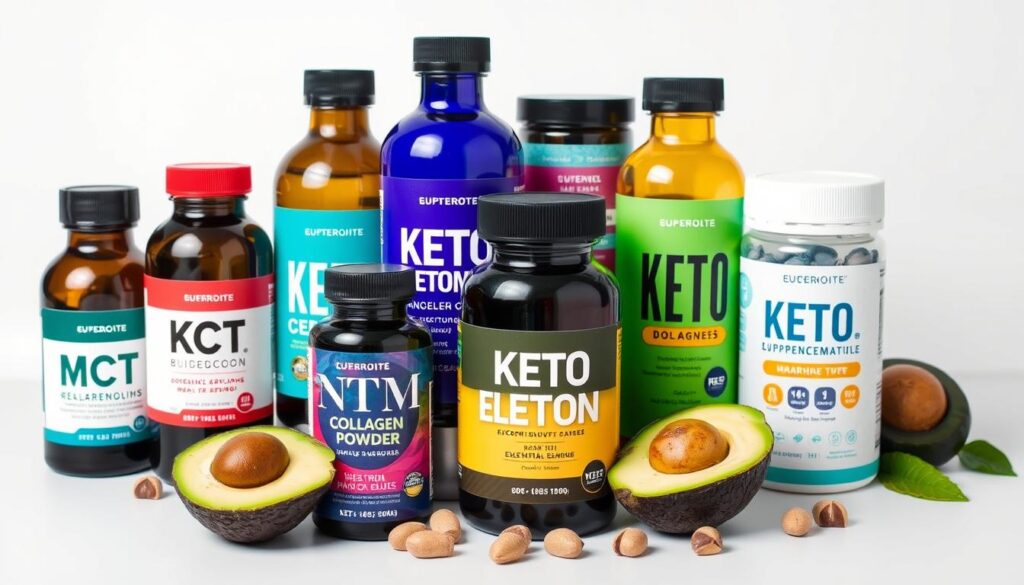In today’s fast-paced world, where health and wellness are of paramount importance, the keto diet plan has emerged as a game-changer in the pursuit of optimum health. This low-carb, high-fat lifestyle has captivated the attention of individuals seeking to improve their overall well-being, manage their weight, and enhance their mental clarity. By harnessing the power of healthy fats and strategically reducing carbohydrate intake, the keto diet has the potential to unlock a transformative journey towards a healthier, more vibrant you.
Adopting a keto diet plan is not a one-size-fits-all approach; rather, it’s a personalized path that caters to the unique needs and preferences of each individual. Through a carefully crafted plan, you can embark on a low-carb lifestyle that not only supports your weight management goals but also nourishes your body and mind, helping you achieve optimum health from the inside out.
Key Takeaways
- The keto diet plan offers a transformative approach to achieving optimal health and wellness.
- By focusing on healthy fats and strategic carb reduction, the keto lifestyle can support weight management and improve mental clarity.
- A personalized keto diet plan is essential for tailoring the approach to individual needs and preferences.
- Adopting a keto lifestyle requires a comprehensive understanding of the underlying principles and potential benefits.
- Navigating the keto journey with guidance and support can help ensure long-term success and sustainable results.
What is the Keto Diet?
The ketogenic diet, or “keto” for short, is a high-fat, moderate-protein, and low-carbohydrate eating plan that has gained significant popularity in recent years. This dietary approach aims to put the body into a metabolic state known as ketosis, where it primarily utilizes healthy fats as its primary fuel source instead of relying on carbohydrates.
Understanding Ketosis
When the body enters a state of ketosis, it starts to break down stored fat and convert it into ketones, which can then be used as an efficient energy source. This shift in metabolic state can lead to a range of potential benefits, including weight loss, improved mental clarity, and reduced inflammation.
The Science Behind Keto
- The keto diet works by restricting carbohydrate intake, typically to less than 50 grams per day, which forces the body to enter a state of ketosis.
- In this state, the liver produces ketones, which can be used as an alternative fuel source for the brain and other organs, reducing the body’s reliance on glucose.
- By focusing on low-carb lifestyle and healthy fats, the keto diet helps to stabilize blood sugar levels, improve insulin sensitivity, and promote fat burning for energy.
“The keto diet is a game-changer for those looking to optimize their health and achieve sustainable weight loss. By understanding the science behind ketosis, individuals can make informed choices to support their metabolic state and overall well-being.”
Benefits of a Keto Diet for Health
Adopting a keto diet can bring about a host of remarkable health benefits. By entering a state of ketosis, where the body burns fat for fuel instead of carbohydrates, individuals can experience significant improvements in various aspects of their well-being.
Weight Loss and Management
One of the primary advantages of the keto diet is its ability to promote weight loss and maintain a healthy body composition. The ketogenic state encourages the body to utilize stored fat as its primary energy source, leading to a gradual and sustainable reduction in body weight. Moreover, the high-fat, low-carb nature of the diet helps to curb hunger and cravings, making it easier to adhere to a calorie-controlled plan.
Improved Mental Clarity
The keto diet has been shown to enhance cognitive function and mental clarity. When the body enters ketosis, it produces ketones, which can serve as an alternative fuel source for the brain. This shift in energy utilization has been linked to improved focus, concentration, and overall mental performance, as the brain operates more efficiently on ketones.
Reduced Inflammation
A well-designed keto diet, rich in nutrient-dense foods, can have a profound impact on reducing inflammation in the body. By limiting the intake of pro-inflammatory carbohydrates and refined sugars, while emphasizing healthy fats and antioxidant-rich vegetables, the keto diet can help to lower systemic inflammation. This, in turn, can contribute to a range of health benefits, including improved cardiovascular function and reduced risk of chronic diseases.

“The keto diet has been a game-changer for my health. I’ve experienced significant weight loss, improved mental clarity, and a reduction in inflammation throughout my body.”
– Sarah, a keto diet enthusiast
Foods to Include in Your Keto Diet
Adopting a keto-friendly lifestyle is all about consuming the right balance of healthy fats, low-carb vegetables, and high-quality protein sources. These nutrient-dense foods are the foundation of the keto diet, providing the energy and nourishment your body needs to thrive in a state of ketosis.
Healthy Fats
Fats are the primary fuel source on a keto diet, and it’s essential to choose the right types. Prioritize healthy fats such as avocados, nuts, seeds, olive oil, coconut oil, and fatty fish like salmon and mackerel. These fats are not only satisfying but also packed with essential vitamins, minerals, and antioxidants that support overall health.
Low-Carb Vegetables
- Leafy greens: Kale, spinach, Swiss chard, and arugula are nutrient-dense options that are low in carbs.
- Cruciferous vegetables: Broccoli, cauliflower, Brussels sprouts, and cabbage are excellent low-carb choices.
- Zucchini and other summer squashes: These versatile veggies can be used in a variety of keto-friendly dishes.
Protein Sources
- Grass-fed meats: Beef, pork, and lamb are great sources of protein on the keto diet.
- Poultry: Chicken and turkey are lean, nutrient-dense protein options.
- Eggs: Whole eggs are a fantastic source of protein and other essential nutrients.
- Seafood: Fatty fish like salmon, mackerel, and sardines provide both protein and healthy fats.
By incorporating a variety of these keto-friendly foods into your meals, you can create a balanced and satisfying low-carb diet that supports your health and fitness goals.
Foods to Avoid on the Keto Diet
Embarking on a low-carb lifestyle for weight management requires strategic food choices. While the keto diet emphasizes healthy fats, certain foods can derail the delicate balance required to achieve and maintain ketosis. Understanding which items to avoid is crucial for optimizing your keto journey and reaping the full benefits of this transformative way of eating.
High-Carb Foods
One of the primary pillars of the keto diet is limiting carbohydrate intake. Foods high in carbs, such as bread, pasta, rice, and potatoes, can quickly kick you out of ketosis, undermining your progress. These starchy items should be strictly limited or eliminated from your keto-friendly meal plan.
Sugary Items
Sugary treats, including cookies, cakes, candies, and even most fruits, are also off-limits on the keto diet. These foods are high in carbs and can spike your blood sugar levels, disrupting the fat-burning state of ketosis. Opt for low-carb alternatives, such as berries or dark chocolate, to satisfy your sweet tooth without derailing your healthy fats intake.
Processed Snacks
Highly processed snacks, such as chips, crackers, and granola bars, often contain hidden carbs and unhealthy additives that can hinder your keto progress. These items should be avoided in favor of whole, low-carb snacks like nuts, seeds, and low-carb vegetables with healthy fats-based dips.
By being mindful of the foods to avoid on the keto diet, you can maintain a sustainable low-carb lifestyle and maximize the benefits of this transformative way of eating for your overall health and weight management goals.

Crafting Your Personalized Keto Meal Plan
Embarking on a keto diet plan for optimum health requires a personalized approach. Crafting a custom meal plan is essential to ensure you’re meeting your unique nutritional needs and achieving your health goals. Let’s dive into the steps to set your macronutrient targets and explore a sample weekly menu to inspire your keto journey.
Setting Your Macronutrient Goals
The foundation of a successful keto diet lies in maintaining the optimal ratio of macronutrients: fat, protein, and carbohydrates. To determine your personalized macronutrient goals, consider factors such as your age, gender, activity level, and overall health status. A general guideline for the keto diet is to aim for:
- 70-80% of daily calories from healthy fats
- 20-25% of daily calories from high-quality protein
- 5-10% of daily calories from low-carb, nutrient-dense foods
By tailoring your macronutrient ratios to your individual needs, you can maximize the benefits of the keto diet and support your overall well-being.
Sample Weekly Meal Plan
To help you visualize a keto-friendly meal plan, consider this sample weekly menu that features a variety of nutrient-dense foods:
| Day | Breakfast | Lunch | Dinner |
|---|---|---|---|
| Monday | Scrambled eggs with spinach and avocado | Grilled salmon with roasted broccoli and cauliflower | Zucchini noodles with pesto and grilled chicken |
| Tuesday | Chia seed pudding with berries and almond milk | Keto-friendly Caesar salad with grilled shrimp | Baked cod with sautéed asparagus and garlic butter |
| Wednesday | Bulletproof coffee with coconut oil and MCT oil | Lettuce wraps with turkey, avocado, and cheese | Stir-fried beef and broccoli with cauliflower rice |
| Thursday | Omelet with bell peppers, onions, and feta cheese | Grilled chicken tenders with roasted Brussels sprouts | Baked salmon with roasted asparagus and lemon butter |
| Friday | Keto-friendly pancakes with berries and whipped cream | Tuna salad on a bed of mixed greens | Bunless cheeseburgers with a side salad |
| Saturday | Avocado toast with crushed walnuts and a fried egg | Grilled chicken skewers with roasted vegetables | Baked lamb chops with roasted cauliflower and garlic |
| Sunday | Keto-friendly breakfast casserole with spinach and bacon | Chopped salad with grilled salmon and avocado | Slow-cooked pork shoulder with sautéed greens |
Remember, this is just a sample plan, and you can customize it to suit your personal preferences and dietary needs. The key is to focus on nutrient-dense foods that will keep you feeling satisfied and energized on your keto diet plan for optimum health.
How to Track Your Keto Progress
Embarking on a keto diet plan for optimum health is an exciting journey, but it’s essential to track your progress to ensure you’re achieving your metabolic state and weight management goals. Fortunately, there are various tools and methods available to help you monitor your keto journey effectively.
Using Keto Apps and Tools
Numerous keto-friendly apps and tools have emerged to assist individuals in managing their macronutrient intake and tracking their ketone levels. Apps like MyFitnessPal, Cronometer, and Carb Manager can help you log your daily food consumption, calculate your macros, and monitor your overall progress on the keto diet plan for optimum health.
Monitoring Ketone Levels
One of the key indicators of being in a state of ketosis is the presence of ketones in your body. You can measure your ketone levels using at-home testing devices, such as urine strips or blood glucose meters designed for ketone measurement. Regularly monitoring your ketone levels can help you understand how your body is responding to the keto diet and make necessary adjustments to your plan.
By leveraging these tools and techniques, you can track your keto progress effectively and make informed decisions to optimize your metabolic state and weight management on your journey towards a healthier lifestyle.
Common Keto Diet Mistakes to Avoid
Embarking on a keto diet journey can be incredibly rewarding, but it’s important to be mindful of potential pitfalls along the way. As you strive to achieve the benefits of a low-carb lifestyle, steering clear of common keto mistakes can help you maintain optimal health and keep your progress on track.
Underestimating Carbs
One of the most significant challenges on the keto diet is accurately tracking your carbohydrate intake. It’s easy to underestimate the carb content of certain foods, which can inadvertently knock you out of ketosis. To avoid this, it’s crucial to become a savvy label reader, thoroughly researching the carb counts of the foods you consume. Staying vigilant about your carb intake is essential for maintaining the delicate electrolyte balance required for a successful keto diet plan for optimum health.
Neglecting Hydration
Proper hydration is another crucial factor often overlooked by those following a keto diet. The low-carb lifestyle can lead to increased fluid and electrolyte loss, which can result in symptoms like headaches, fatigue, and muscle cramps. To combat this, it’s important to stay well-hydrated by drinking plenty of water and consuming electrolyte-rich foods or supplements. Maintaining optimal electrolyte balance is key to supporting your overall well-being on a keto diet.
By being mindful of these common pitfalls and taking proactive steps to address them, you can navigate the keto diet with confidence and achieve your health and wellness goals.

Transitioning into a Keto Lifestyle
Embarking on a low-carb lifestyle can be an exciting journey, but it’s crucial to approach the transition with care and preparation. The keto diet requires a significant shift in your metabolic state, and managing this process can make all the difference in achieving your health goals.
Tips for a Smooth Transition
Gradual change is the key to a successful keto adaptation. Start by gradually reducing your carbohydrate intake over several weeks, allowing your body to adjust to the new electrolyte balance and metabolic state. This step-by-step approach can help minimize potential side effects and make the transition more sustainable.
- Gradually decrease your carb intake, aiming for a moderate reduction initially.
- Increase your consumption of healthy fats to support your new metabolic state.
- Stay hydrated and replenish electrolytes like sodium, potassium, and magnesium to help your body adapt.
Managing Keto Flu Symptoms
As your body adjusts to the keto diet, you may experience the “keto flu” – a temporary set of symptoms such as fatigue, headaches, and muscle cramps. These are a natural part of the transition, and with the right strategies, you can manage them effectively.
“The keto flu is a natural response as your body adapts to using fat for fuel instead of carbs. By addressing electrolyte imbalances, you can minimize the discomfort and make the transition smoother.”
To manage the keto flu, ensure you’re consuming adequate amounts of water and electrolytes. Supplement with magnesium, sodium, and potassium as needed to support your body’s electrolyte balance. Additionally, prioritize rest and gentle exercise to support your overall well-being during this period of adaptation.

By approaching the transition to a low-carb lifestyle with patience and proactive measures, you can navigate the initial challenges and set the stage for long-term success on your keto journey.
Incorporating Exercise into Your Keto Routine
Embarking on a keto diet journey goes hand-in-hand with a comprehensive fitness routine. By synergistically combining the weight management benefits of the keto diet with the muscle-building and metabolic advantages of exercise, you can optimize your path to optimal health.
Best Exercises for Weight Loss
To maximize weight loss on a keto diet, focus on high-intensity, calorie-burning exercises that help you maintain your metabolic state. Incorporate a mix of the following activities into your weekly routine:
- High-Intensity Interval Training (HIIT) workouts
- Brisk walking or jogging
- Swimming or cycling
- Strength-based resistance training
The Role of Strength Training
Strength training plays a vital role in a keto diet plan for optimum health. By building lean muscle mass, you can boost your metabolic state and support long-term weight management. Incorporate compound exercises that target multiple muscle groups, such as squats, deadlifts, and push-ups, to maximize the benefits of your keto diet and exercise routine.
| Exercise | Benefits for Keto Dieters |
|---|---|
| Squats | Engages large muscle groups, increases metabolic rate, and supports weight loss. |
| Deadlifts | Builds full-body strength, improves insulin sensitivity, and promotes fat burning. |
| Push-ups | Targets multiple muscle groups, boosts upper body strength, and enhances overall fitness. |
By incorporating a well-rounded exercise routine into your keto diet plan for optimum health, you can unlock the full potential of your weight management and metabolic state goals.

Supplements that Support a Keto Diet
Navigating the keto lifestyle often requires strategic supplementation to ensure your body receives essential nutrients and maintains optimal metabolic state. Two key areas to focus on are essential vitamins and minerals, as well as exogenous ketones.
Essential Vitamins and Minerals
When following a low-carb, high-fat ketogenic diet, it’s crucial to pay attention to your electrolyte balance. Supplements like sodium, potassium, and magnesium can help replenish the electrolytes often depleted during the transition to ketosis. Additionally, nutrient-dense foods may be limited, making targeted vitamin and mineral supplements beneficial for overall health and energy levels.
Exogenous Ketones
Exogenous ketones, or ketones produced outside the body, can be a powerful tool for supporting a ketogenic lifestyle. These supplements can help raise your blood ketone levels, potentially aiding in the maintenance of ketosis and providing a quick energy boost. However, it’s important to consult with a healthcare professional before incorporating exogenous ketones into your regimen, as they may interact with certain medications or health conditions.
Ultimately, a well-rounded supplementation strategy, combined with a focus on nutrient-dense whole foods, can help you thrive on the keto diet and achieve your health and wellness goals.

Success Stories on the Keto Diet
The ketogenic diet has transformed the lives of countless individuals seeking to achieve optimal health. From remarkable weight management to enhanced mental clarity, the power of this low-carb, high-fat dietary approach is undeniable. Let’s dive into real-life success stories and expert testimonials that showcase the profound benefits of a keto diet plan.
Real-Life Transformations
Sarah, a 42-year-old mother of two, had struggled with her weight for years. After adopting the keto diet, she experienced a remarkable transformation. “I lost over 40 pounds in just a few months, and the weight has stayed off,” Sarah shared. “But the real game-changer was the boost in my mental clarity and energy levels. I feel sharper, more focused, and better equipped to handle the demands of my busy life.”
Michael, a 56-year-old businessman, had been dealing with chronic inflammation and joint pain. “The keto diet was a game-changer for me,” he said. “Within weeks, I noticed a significant reduction in inflammation, and my joint pain virtually disappeared. I have more mobility and can engage in physical activities I once thought were off-limits.”
Expert Testimonials
“The ketogenic diet has proven to be an effective tool for weight management, metabolic health, and cognitive function. I’ve seen firsthand the remarkable transformations in my patients who have embraced this lifestyle change.” – Dr. Samantha Wilkins, Registered Dietitian and Nutritionist
“Adopting a keto diet plan can have a profound impact on overall well-being. By optimizing fat burning and reducing inflammation, individuals can experience benefits ranging from improved weight management to enhanced mental clarity.” – Dr. Michael Gonzalez, M.D., Internal Medicine Specialist
The testimonials and transformations showcased here are a testament to the power of the ketogenic diet in supporting optimal health and well-being. Whether your goal is weight management, mental clarity, or overall vitality, this low-carb, high-fat approach may be the key to unlocking your full potential.
Your Long-Term Keto Strategy for Health
Maintaining a keto diet plan for optimum health is a lifelong journey that requires adaptability and a willingness to reassess your goals over time. As you progress through your low-carb lifestyle, it’s essential to stay flexible and make adjustments to ensure your diet continues to support your overall well-being and weight management objectives.
Maintaining Your Keto Lifestyle
Remaining committed to the keto diet long-term involves finding a sustainable approach that fits seamlessly into your daily routine. This may require experimenting with different food combinations, adjusting your macronutrient ratios, and finding ways to make keto-friendly meals that you genuinely enjoy. Surround yourself with a supportive community, whether it’s online forums or like-minded friends and family, to help you stay motivated and accountable.
When to Reassess Your Goals
As your body and lifestyle evolve, it’s crucial to periodically reevaluate your keto plan and make necessary modifications. This might include adjusting your carb intake, incorporating new types of exercise, or adding targeted supplements to address any nutrient deficiencies. Regular check-ups with your healthcare provider can help you monitor your overall health and identify any areas that require attention, ensuring your keto diet plan for optimum health continues to serve you well in the long run.